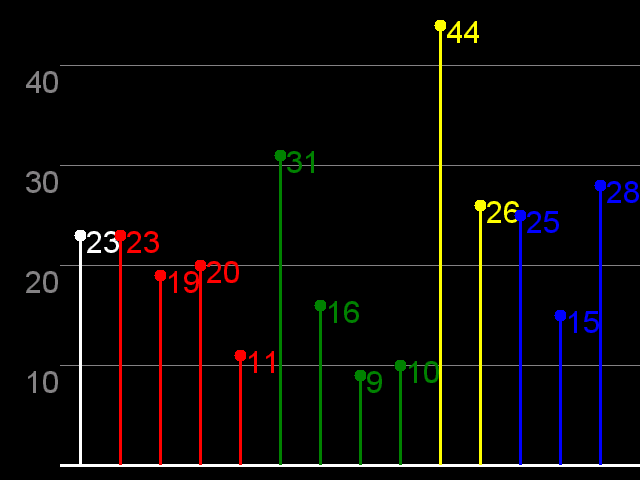An Examination of Skill pt.5
 Friday, April 16, 2010 at 11:56PM
Friday, April 16, 2010 at 11:56PM To test your knowledge skills B.E.S presents....

KNOWLEDGE is essentially a collection of Simon like games each designed to test a specific aspect of your knowledge skills.

- Standard game: This is a classic and basic memory game that's important for measuring your knowledge skills. In each round, the sequence is repeated giving players ample chances to confirm and reaffirm the sequence.
Variation 1
- Variation 1: New note only: In this mode, only the last note of the sequence is given. This means that the number of repetitions of the sequence is cut in half compared to the standard game. In other words, the only time you'll hear the full sequence played out is when you do it yourself. This game also tests your ability to organize a sequence from a non linear presentation.
- Variation 2: 2 Notes at a time: Because the sequence is presented 2 notes at a time, the rhythmic feel can help you organize the data into chucks. If you use the rhythmic chunks to your advantage, you'll probably find yourself inputting the sequence with the same rhythm.
- Variation 3: 3 Notes at a time: Like the previous variation, the sequence is given in groups of 3 notes at a time. 3 bits of sequence are easier to chunk into shapes. In other words, you can compress the data into an L, J, U, N, etc shapes to help strengthen your memory.
- Variation 4: Random strings. The sequence is randomized each round. This is the ultimate test of your ability to quickly and effectively memorize sequences.
Variation 2
- Variation 5: Reverse. Though the sequence is given in forward order, you must input the sequence in reverse order. This game tests your ability to manipulate data first, and then store it.
- Variation 6: Delete a color. Keep track of the sequence as it grows. You'll be asked randomly to delete a color from the sequence when inputting it back. Keep in mind that this request is only temporary. While the standard game and the first set of variations are designed around linear sequencing, the games in this set require the player to manipulate their knowledge. You'll find that you need a lot more brain power and/or time to effectively make adjustments to the sequence.
- Variation 7: Swap a color. Like delete a color, you'll be asked to swap one color for another randomly.
- Variation 8: Switch a color. Like swap, you'll be randomly asked to switch two colors and repeat back the sequence.
- Variation 9: Only visuals. No Sound. If you're the kind of player who uses the sound of the sequence to help you get by, now you can test your ability to only work with visuals.
- Variation 10: Only sound. No visuals. Likewise. If you're the kind of player who relies on chunking information by the patterns/shapes of the sequence, this mode will remove that technique from the equation.
Furthermore, I found that in the sound only mode I continued to chunk/code the sequence by shapes. To do this, I had to take some extra time to think about my fingers to see the shapes in my mind.
- Variation 11: Keyboard code. Memorizing long strings of data is all about chunking or compressing the data. Many people use images, stories, or pictures to help them memorize information. In this mode, because the buttons are arranged over a keyboard layout, you are free to create words to help you compress long strings into memorable sentences.
- Variation 12: Crack the Code. In a minute, try to figure out as much of the sequence as you can. The speed of the game is completely player controlled. Be careful not to go so fast that you don't learn the sequence. Also, try not to overload your mind with repeated mistakes.
- Variation 13: Long Term Marathon. This game tests your long term memory by forcing you to wait a minute before entering the sequence each turn. Getting a decent score in this game is going to take you half an hour or so. If you think it's boring to wait that long, then you should do something else in the meantime. The point of the game is to memorize the sequence for the long haul by putting it in your long term memory. If you do this, you can essentially forget about the game for minutes at a time and completely focus on doing something else. Depending on how good you are at storing the information, you might find yourself rehearsing the sequence mentally while the timer ticks down.
If you spend a bit of time here and there to get your highest scores on all of the games, the data can then be analyzed. Of course, the game doesn't produce scientifically verifiable facts about your brain or learning styles, but it does go a long way in pointing us in the right direction. With the results, you might learn something key about yourself. Also consider the possibility of boosting your scores significantly with just a few tips/tricks from the creators. If learning is like playing a video game, then certainly you can get better at it.
I encourage you to give KNOWLEDGE a try, and share it with everyone you know. Feel free to email me your .txt save files or a screenshot of your high scores page by hitting F9 on the records page. Check out my scores below.

These are my current scores. How do you stack up?
I wonder if Knowledge is the best Simon type game on the net?


Reader Comments (1)
Simon with a bunch of variants. Pretty sweet. Dig the piano. Playing marathon now